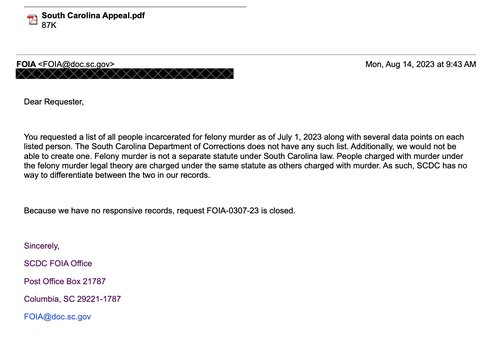DataSouth Carolina
Inadequate Data
to perform any analysis.
| Request Responsiveness | |||||
| Financial Accessibility | |||||
| Timeliness | |||||
| No Residency Required | |||||
| Appeal Responsiveness |
*These factors track the process--i.e. the effort and obstacles--for obtaining data from individual states under the Freedom of Information Act (FOIA) request and appeals process. These factors do not measure the quality of the data; only the process of attempting to obtain the data.
Data Status
-
21
days to respond to our FOIA request
"Felony murder is not a separate statute under South Carolina law. People charged with murder under the felony murder legal theory are charged under the same statute as others charged with murder. As such, SCDC has no way to differentiate between the two in our records."
South Carolina took 21 days to respond to our FOIA request with an Excel spreadsheet of people incarcerated, but not specific to those convicted and sentenced for felony murder.
South Carolina’s statutes are not specific for felony murder. As in most other states, South Carolina does not have a statute specifically codifying felony murder, which would make it easier to identify and isolate felony murder conviction data. Instead, as in most other states, felony murder is defined within its other murder statute, making it impossible based on the data provided alone to distinguish and identify who is incarcerated for felony murder specifically.
Although we appealed the FOIA results and asked for more specific data related to felony murder, South Carolina told us that the state does not maintain felony murder data.
Legal Overview
In South Carolina, felony murder is defined in the first degree murder statute (S.C. Code Ann. § 16-3-10).
Prosecutors can charge and convict any person of murder without having to prove that they intended to cause another person’s death. Although South Carolina requires prosecutors to prove that a person acted with “malice” in causing a death in the commission of another felony, “malice” may be inferred from participation in an underlying felony. Lowry v. State, 657 S.E.2d 760, 764 (S.C. 2008).
A conviction for felony murder carries a sentence of 30 years to life, or death.
Access the Data
Learn more about how you can contribute to transparency when it comes to felony murder.
